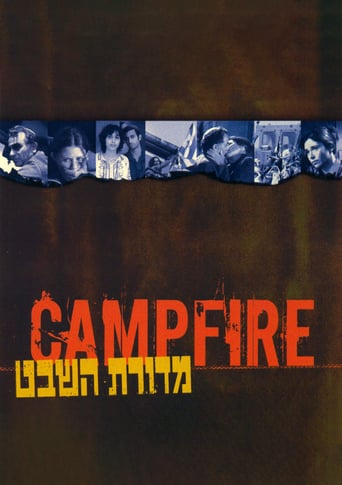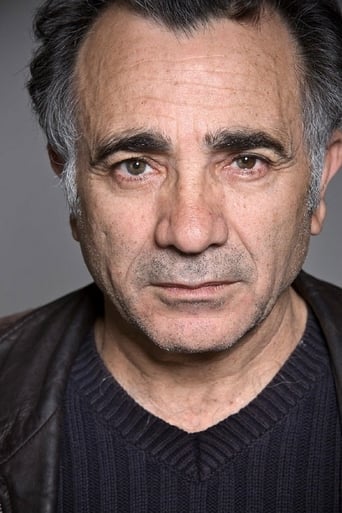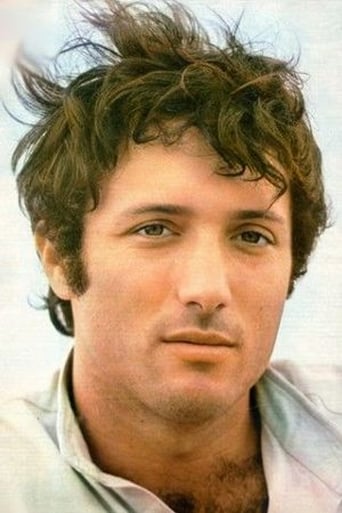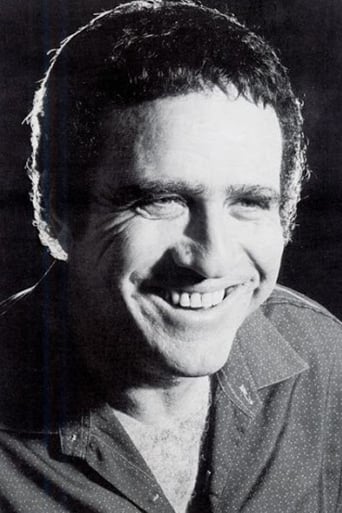

Campfire (2004)
The story of one woman's personal battle for acceptance, but also a portrait of a political movement that has forever affected millions of lives in the Middle East.
Watch Trailer
Cast
Reviews
Overrated and overhyped
In truth, there is barely enough story here to make a film.
a film so unique, intoxicating and bizarre that it not only demands another viewing, but is also forgivable as a satirical comedy where the jokes eventually take the back seat.
This is a coming of age storyline that you've seen in one form or another for decades. It takes a truly unique voice to make yet another one worth watching.
Joseph Cedar's Campfire takes the 2004 perspective on the West Bank settlements as they were approached in 1981. Hindsight exposes the ostensible idealism behind the settlement movement as a violent, aggressive macho strut.The foreground story of a one-year widow Rachel, her sexually active and angry daughter Esti and her blossoming teen Tami (who narrates), reflects upon the background story of an ideologically based new settlement planned for the windy desert near Ramallah. Seeking some assurance of community, Rachel is determined to move with her daughters to that settlement, despite its committee's reluctance to admit a manless family who can't contribute to the guard duties. Only Rachel's long friendship with the commune's chief Motkeh's wife gains her even tentative acceptance.The high-blown principles of the settlement are exposed by Motkeh's callous response to Tami's sexual assault at the festival bonfire. The rough, vicious boys and Motkeh's own hypocritical son reveal a lawlessness and macho bullying underneath the settlement's pretences. That confirms the film's first theme, the vulnerability of women, from Rachel hiding her husband's death from potential car-buyers, to the settlement committee's doubts about her, to the boys' abuse of Tami, which moves from verbal to physical and back to the verbal slander of the graffiti. The arid macho wind of the settlement — in men and boys alike — contrasts to the softness of the bus driver Yossi, who admits to Rachel he's a virgin and to Tami that he may lack what it takes ever to marry. When he takes Rachel on a dinner date in his empty bus it's an emblem of a community resource, awaiting fulfilment. His use of his job on a date improves from the contrast to the cantor's burst of Kol Nidrei on the hotel steps on his first date with Rachel.With all the men in kipahs Cedar frames out the secular Israel. This film is about the religious aspirants and their suspect attitude toward the isolation and loss among its citizenry. In both the cantor's Kol Nidrei and his choral lead bemoaning the people's pathetic condition, viewed from the heavens, the vanity of the singer swamps the submission of the song. Hence the poetic justice when he steps in the cow dung on the settlement's tour with Yossi. So, too, the military's representation by two soldiers, Esti's uniformed beau, who shows respect for her mother and accepts Esti's restraints, and the out-of-uniform boor who has no friends his own age so hangs out with the young boys and violates Tami. Any man's army is ambivalent like that. Despite Motkeh's communitarian pretensions and the cantor's false modesty and religious pretences, the effective hero is Yossi. He immediately appreciates Rachel more deeply than even her long-term friends do. He means his offer of a bus ride whenever she needs, no strings attached. He's comfortable with her daughters but feels no need to impress them. As he revives the family's dead battery, he restores Rachel's warmth and openness and in general provides a humanity and respect the settlement organizers lack. In the last scene the bus driver sits with Tami in the back seat while Esti drives the family car, her mother at her side. Yossi's unpretentious service is the film's dominant value. A modest but sincere personal commitment trumps the more problematic claims of the organized new community. For more see www.yacowar.blogspot.com.
Campfire (Medurat Hasevet) marks the last film for me during the Israel Film Festival, and personally, I thought this film was the most mature of the lot, being honest in exploring the lives and relationships in all members of a single parent family. Being all women in the house, recently widowed Rachel Gerlik (Michaela Eshet) takes great pains in order to protect her daughters Esti (Maya Maron) and Tami (Hani Furstenberg) from growing pains, and it is in the characters that we see an observation of romance in three forms.For Rachel, it is a second chance at real romance. She admits to her daughters that she has never been in love, not even with their father, and opportunity comes in the form of Yossi (Moshe Ivgy) the bus driver, who's attentive and sincere, and while having his own awkward moments at professing his love, you're likely to root for him to get his girl. Rachel though has her hands full, in juggling a fight to be accepted by her community in order to relocate to the new West Bank settlement to start life afresh, now made complicated by a potential love, and in trying to reconnect with her daughters.In elder daughter Esti, we see budding puppy love, as well as her very distinct opposition with her mom, stemming from Rachel's refusal to provide her with some privacy at home. I guess every parent will have to face their kids at this point in their teenage lives, and hopefully live to tell the tale of triumphant tolerance in the face of constant cynicism. And lastly, probably the saddest of the lot, with Tami and her brush with one ugly emotion of Lust. The English title at least, refers to a pivotal moment in the story which involves around the Bonfire incident, and you can't help but seethe with rage, where writer-director Joseph Cedar succeeds in eliciting anger with a sense of helplessness, and deep despair.What succeeded too is the performance of Hani Furstenberg in fleshing our her character, as we witness her credible spectrum of emotions ranging from the damsel in distress, and in being able to draw strength from within to deal with her terrible ordeal. Her chemistry with Michaela Eshet is quite amazing, and you will definitely be moved at how their characters interact with each other in the dealing with the fallout, even though it was just a short scene. I guess nobody should be made to suffer in that manner without clear repercussions or punishment, but reminds you in real life that sometimes there are situations where you can't expect everything to go in your favour, even though you're right and are seeking justice.Instead, we see how one can face up to adversary in whichever form they take, and through Rachel, we realize that the well intent of others, who subconsciously impose their will and thoughts onto yourself, becomes enslaving, and there comes a time where one must break free. Free from living a life dictated by the community, of the need to conform unnecessarily, and to learn to stand on your own two feet. Michaela Eshet encapsulates this development of her character, and you can't help but to cheer silently when she finally breaks free from a mindset bondage.It might be a small movie with a small principle cast, but its message and lesson couldn't be more than relevant, especially when it comes to the notion of blood being thicker than water, with a mother's love that knows no bounds.
I saw this film with a group of 60 people, most of whom stayed for a discussion afterward. The story seemed relatively straight-forward to me. SPOILERS: It takes place in the 1980's. A group of people associated with the B'nai Akiva (modern Orthodox/Zionists)want to establish a settlement on the West Bank close to the Palestinian city of Ramallah. The focus is on a young widow and her two teenage daughters. The woman desperately wants to be accepted into the community. The difficulty from the group's standpoint is that she has no husband, and this is a highly patriarchal society in which a woman's place is definitely NOT as head of a family. Rachel, the mother goes on a couple of blind dates, one with a man (Yossi) who operates his own bus (Mini-Yossi), the other with a pompous man-of-the-world who is a cantor in his spare time and who considers himself and artist and is considered an artist by others. Yossi, never married, is a middle aged virgin, very plain. In the beginning, Rachel is not attracted to him, nor to the cantor. It is not until much later in the picture, as Rachel begins to reveal herself to Yossi, that we learn she never loved her husband and, though it is unrealistic, she wants to fall in love with someone who makes the sparks fly. The older of the teen-age daughters, Esty, is busy trying to make out with her boyfriend behind closed doors. Tammy, 15, is also very interested in her own sexuality. In the scene that is the movie's centerpiece, Tammy and a girl friend follow the "bad boys" of the group to a huge bonfire where Tammy is assaulted by the oldest member of the group (her friend has immured herself in a nearby automobile) and raped or, at the very least, seriously abused by the gang leader and several of its members. Graffiti describing her as a whore are soon all over the stone walls of the neighborhood in which she lives. Rachel is accused of being completely self-centered. Facing the crisis in her family, she takes a vote on whether to join the settlement community, and when they vote to accept her despite her status as a single mother, she tells them she is no longer interested. When the credits roll, the audience is left to anticipate that she will have sex with Yossi and perhaps marry him. Tammy never reveals exactly what happened to her but in the final scene announces that she plans to have a happy year. When the film was over and the discussion began, the Israeli-born woman leading the discussion began to talk about B'nai Akiva and the settler movement of the 1980's. Several other Israelis present insisted that the movie had little to do with B'nai Akiva but was representative of sexism which pervaded ALL of Israel in the 1980's. Although the discussion leader and others tried to talk about the director's intent (which was certainly a comment on the specific characteristics of the B'nai Akiva movement), the other Israelis would have none of it. They insisted it could have happened anywhere with any group of Israelis. A point that interested me, but did not get much attention during the discussion, was that, apart from the knit skull caps worn by the men and boys in the film, there were no sign that religion played any part at all in the life of the aspiring community.Was Tammy raped? Perhaps there was no sexual intercourse but she was certainly assaulted and shamed? Was Rachel all that selfish? Not in my eyes. She was trying to make a place for herself in a patriarchal society. Were the rebellions of her two daughters justified? They were teenagers, experimenting with their own sexuality, and they had lost their father, whom they apparently adored. Did Tammy "invite" the abuse? By the standards of the 1980's, she certainly did. She went searching for the boys and told a dirty joke to fit into the crowd. But it was also clear that she did not expect to be sexually abused and did not "want it," as the boy she was most attracted to inferred. I felt it was an interesting movie and that it was about what it was about -- and not about all Israelis during that period.
Take it from me, as one who is blood and flesh of this community, this is an extremely poignant and ACCURATE film, aside from being first-class cinema. Watching Asi Dayan as the founder of a settlement, Moshe Ivgy as a religious-Zionist loser/tragic hero and the hysterical Yehoram Gaon play an ASHKENAZI cantor was an incredible combination. Enjoy!I think this policy of writing a minimum of ten lines is quite stupid as i am sitting at work right now and do not have the time to compose a magnum opus - this is a stupid policy that undermines intelligent people like myself who do not write long dissertations on films and know that most people do not have the patience to read such diatribes. Thank you.


